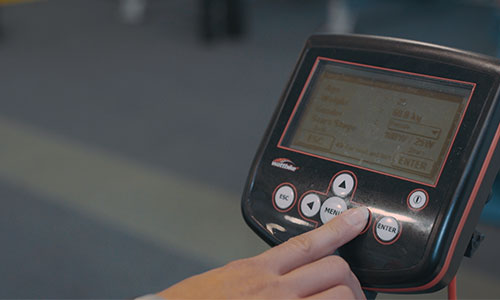Simple test for a healthy heart
- Overview
When you go to the gym, you’re probably thinking about improving your athletic performance, toning up, losing weight and let’s be honest – looking good. You're probably not thinking about your heart health or your future risk of disease.
Your ability to recover from exercise, or how fit you are, is actually one of the best predictors of your long-term risk of disease. Research suggests that being unfit is actually a greater risk to your future health than being a smoker or having diabetes. So what if there was a simple test you could do to find out more about the state of your health?
Listening to your heart
The key to this test is how well your heart recovers in the first minute after exercise. To do this you’ll need to gradually raise your heart rate to near your maximum and check how quickly it drops once you stop the exercise. You’ll need three things:
- A heart rate monitor
- A scale to measure your rate of perceived exertion (RPE)
- To know when to stop
The maximal ramp test

This test won’t quite get your heart rate to its maximum but make no mistake, it’s tough and not for the faint hearted. It’s designed for regular gym users or those who run, cycle or play sport recreationally.
We recommend using a Wattbike. It’s one of the most accurate exercise machines we know and it has a maximal ramp programme built-in, managing the rate at which you exert yourself. All you have to do is input a little information about yourself before you start.
“You're doing yourself a big favour by measuring your fitness and continuing to stay fit in the long term.”
If you don’t have access to a Wattbike you can do the test on a treadmill or running outside but results may be less accurate. You’ll need to manage your own RPE and wear a heart rate monitor. Read our RPE guide here.
When to stop

This test is challenging and if you have any pre-existing conditions you shouldn’t attempt it without first consulting your GP or health professional. The most important reason to end the test is when you near your maximum heart rate. This is easy to calculate:
Other reasons to terminate the test:
- Progressive angina pain
- Extreme rapid increase in heart rate
- Failure to raise heart rate and blood pressure during the test
- Headache, blurred vision, pale or clammy skin
- Dizziness or near fainting
- Fatigue so severe you cannot speak
Measuring your recovery

As soon as you finish the test, take a note of your heart rate. It should be very high and near your maximum. Lie or sit down immediately and time for one minute. When a minute has passed, note your heart rate again. This will give you the amount of beats per minute your heart recovers by.
Low risk
If your heart rate drops by more than 18 beats in the first minute you are likely to have a good level of fitness and have low risk of heart disease and other conditions.
At risk
If your heart rate drops by 18 beats or less you are less likely to be fit and you may be showing some early warning signs of future disease. Make an appointment to see your GP or book in for a Health Assessment.
High risk
If your heart rate drops by only 12 beats or less there is a higher probability that you are unfit and are at risk of disease. See your GP more urgently.
These results need to be taken with a pinch of salt, especially if you are performing the maximal ramp test unsupervised. Wattbikes are available in all Nuffield Health gyms and are used by our physiologists conducting health assessments.
Staying fit, protecting your health
I’ve been a physiologist for over eight years and in that time I’ve seen thousands of clients. I can’t stress enough how important fitness is to your long term health. Studies have shown that fitness is a strong predictor of all-cause mortality. In fact, it’s a stronger predictor than traditional indicators like high cholesterol or blood pressure.
If you’re concerned about your lack of fitness and what it means for your future risk of disease, don’t worry. Your heart rate recovery can improve as you get fitter, so you're doing yourself a really big favour by measuring your fitness and continuing to stay fit in the long term.
Last updated Friday 28 April 2023
First published on Friday 20 May 2016


